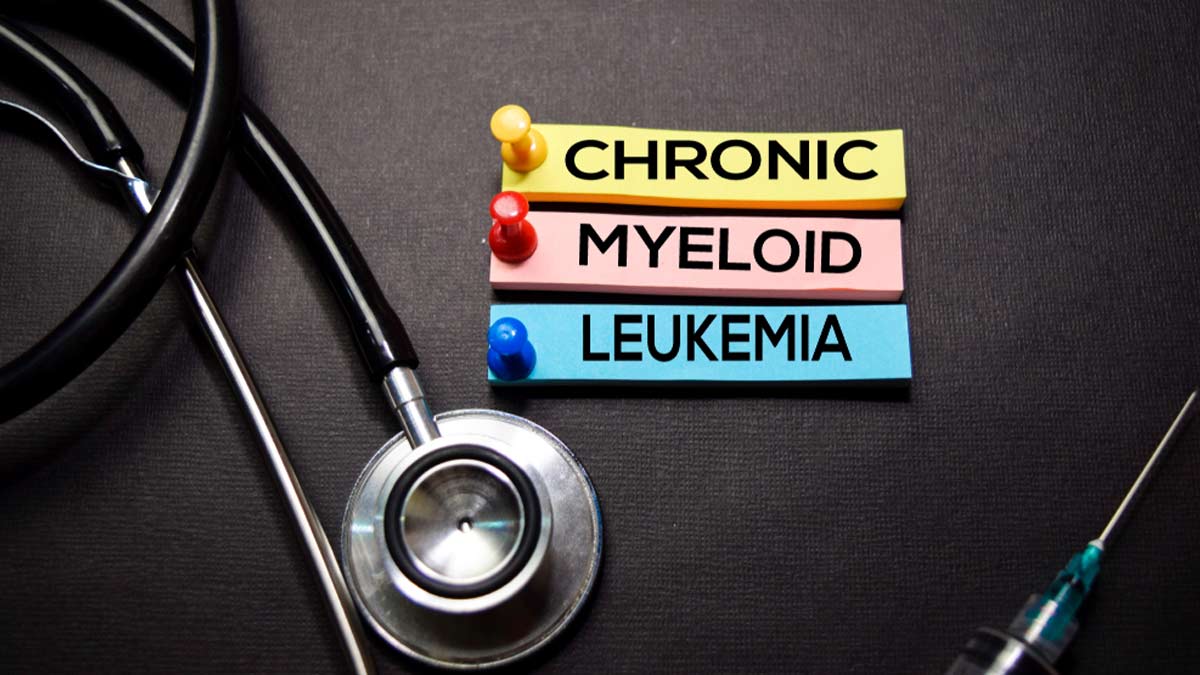
Chronic Myeloid Leukaemia (CML) is a type of blood and bone marrow cancer that affects the myeloid cells, which are responsible for producing White Blood Cells (WBCs), Red Blood Cells (RBCs), and platelets. Many patients have to understand despite the initial shock of a cancer diagnosis, it's crucial to understand that CML can be effectively managed with the right approach. We spoke to different experts who explained CML, its challenges, proactive tips, and the treatment approach.
Table of Content:-
Understanding Chronic Myeloid Leukaemia

According to Dr Hemant Malhotra, Professor and Head, Department of Medical Oncology, Mahatma Gandhi College Hospital, Jaipur, “CML is often misunderstood, with patients sometimes confusing it with other forms of leukaemia, especially acute leukaemia, a disease which is much more aggressive and life-threatening.”
“In CML, the uncontrolled growth of WBC in the bone marrow defines its characteristic features. CML progresses through three distinct phases: chronic, accelerated, and blast, with the chronic phase accounting for approximately 90% of all CML cases. This phase can extend over several years, but if left untreated, CML can advance to the accelerated and blast phases,” he added.
According to StatPearls, CML has a global annual incidence rate of 0.87 per 100,000 people, which rises to 1.52 per 100,000 in individuals over 70. It occurs slightly more frequently in males, and the median age at diagnosis is 56 years.
Also Read: World Lymphoma Day 2023: Expert Shares Key Differences Between Lymphoma And Leukaemia
Managing Challenges
“Although CML is often referred to as a 'good cancer' due to its manageability, it is crucial to understand that as CML progresses, it becomes more problematic. Some patients may develop resistance to medications or experience side effects that affect their daily lives,” highlighted Dr Malhotra.
However, timely interventions and careful monitoring can help prevent or manage these challenges. Effective communication with healthcare providers is essential for optimal management and instils a sense of hope and confidence throughout the treatment journey.
Comprehensive Approach to Management
.jpg)
Dr Rahul Naithani, Director and Head, Hematology and Bone Marrow Transplant, Paras Health, Gurugram, said “Today, patients with CML can hope to have a normal life. Managing CML needs a comprehensive approach. Regular monitoring of BCR-ABL levels every three months is vital for understanding treatment effectiveness and disease progression.”
Also, counselling plays a crucial role in helping patients cope with the emotional and psychological challenges of living with a chronic illness. Under strict monitoring, a significant proportion of patients achieving good responses could completely go off medicines after an initial five years of therapy.
In addition to medical considerations, the emotional repercussions of CML must not be underestimated. The initial hurdle of social stigma attached to cancer among CML patients. Many individuals are reluctant to share their diagnosis beyond their immediate family due to societal attitudes. “Strong familial support and emotional resilience are pivotal in this context. Open dialogue with loved ones and accessing mental health assistance as required are integral elements of a comprehensive approach to managing CML,” added Dr Naithani.
Also Read: Down Syndrome Awareness Month: Why Are Children With Down's Syndrome More Prone To Leukaemia?
Emotional Impact and Support
Dr Sameer Tulpule, Senior Consultant, Haematology and Bone Marrow Transplant, Kokilaben Dhirubhai Ambani Hospital, Mumbai said, “From my observation, I have seen a lot of patients undergo severe emotional distress due to CML. However, patients diagnosed in the chronic phase, where the disease is more controllable, can lead fulfilling lives despite the challenges.”
It's crucial to remain proactive in managing CML since untreated chronic phase CML can progress rapidly if not treated in time. It's essential to monitor your BCR-ABL levels regularly and adhere to treatment goals to ensure the effectiveness of your treatment and prevent disease progression.
“Counselling is also a vital aspect of helping patients manage the emotional and psychological challenges of living with a chronic illness. Also, discussing the latest therapies with your doctor can help you comprehend the treatment journey and attain a better quality of life,” added Dr Tulpule.
Proactive Tips for Patients

Here are some proactive strategies to assist you on your journey with CML:
- Regular Monitoring: Consistently track your BCR-ABL levels to evaluate treatment efficacy and detect any changes promptly. Regular monitoring is crucial for timely interventions and halting disease advancement.
- Holistic Approach: Adopt a comprehensive approach by integrating mental health support, dietary modifications, and regular exercise into your daily routine. This holistic approach enhances overall well-being and aids in managing CML effectively.
- Open Communication: Engage actively in candid discussions with your healthcare provider and caregiver. Share any concerns, symptoms, or obstacles you encounter throughout your CML journey to ensure adequate support and management.
- Support Networks: Establish connections with fellow CML patients through support groups to exchange experiences, receive emotional backing, and diminish feelings of isolation during your journey.
Treatment Outcomes and Quality of Life
According to a 2015 study, the exact prevalence of CML is unclear, however, it is estimated to be between 10 and 12 per 100,000 people, with a steady increase attributed to significant improvements in patient survival. CML treatment, particularly Tyrosine Kinase Inhibitors (TKIs), has significantly improved outcomes and quality of life.
Bottomline
While CML may be a part of many individuals' lives, it should not serve as a defining aspect of their identity. It's important to recognise that your active participation in treatment and focus on emotional well-being significantly contribute to better health outcomes and a higher quality of life.
[Disclaimer: This article contains information provided by an expert and is for informational purposes only. Hence, we advise you to consult your expert if you are dealing with any health issues to get the necessary treatment.]
Also watch this video
Read Next
Are Brain Tumours Always Cancerous? Expert Differentiates Between Benign And Malignant Tumours
How we keep this article up to date:
We work with experts and keep a close eye on the latest in health and wellness. Whenever there is a new research or helpful information, we update our articles with accurate and useful advice.
Current Version
